By Craig Nash
One of my favorite pastimes as a Wacoan is talking about Waco. Of the small handful of places I have lived in my life, none have been as self-reflective as this community. This has been the case at least since I moved here in the summer of 2000, and has reached new levels of intensity over the past few years as cameras have been rolling and downtown booming. In those early days all our talking was about potential. “If only” type conversations. We still talk about potential a lot, but enough “If onlys” have occurred that we have allowed those conversations to happen less frequently.
But as much as I love talking about and reflecting on the life of this city, I enjoy more the times spent on my block full of individuals and families who aren’t expending a lot of energy thinking and talking about Waco, its potential, past or current status. I live in Sanger Heights, but within seven blocks of my house are the Brook Oaks, North Waco, Dean Highland, Brookview and Heart of Texas Neighborhoods. It’s the nexus of the Waco solar system, really, and it contains multitudes. As far as I can tell, no one on my block are close friends with anyone else on the block. We don’t have neighborhood parties or borrow sugar and eggs from each other. But we are neighborly.
For the first 2-3 years I lived in my current house, there was a lot of transition on the block and, perhaps connected, a lot of crime. My immediate neighbors to the north had lawn mowers and air units stolen. There were gunshots regularly. I had 7 break-ins within a three year span. I can’t be sure if they stopped because I finally got a home alarm system or word just got around that I owned nothing of value, but overall it has become a quiet, peaceful neighborhood.
I’ve seen kids grow up in the neighborhood. Luis, who was eight when I first moved in, is now a senior at Waco High. I once bought him a new soccer ball because my dog destroyed one he accidently kicked into my back yard. Ever since, he has rolled my trash bin back to the house from the curb in the evening about once a month. I’m not saying this is a deliberate long-term exchange of kindness on his part, but I like to think it is. Every time I am seen doing work on the exterior of my house, (which, as anyone who has seen my house knows, isn’t that often,) Luis’ dad, Miguel, asks me if I am moving. He is always relieved when I tell him I have no plans to move anytime soon. In his broken English he tells me how much he likes the current stability of the neighborhood. He doesn’t use those words, of course, but just says, “I’m afraid of new people moving in all the time.”
There is a new family in the neighborhood, though, that has changed things for us. Jayden acts and talks like an 11 year old, because he is 11 years old, but looks like a 15 or 16 year old. He’s brightened the place up. He knocks on every door in the block asking if any of us have work for him, but really he just likes to talk. When he first arrived he offered to mow my yard for $2. Still under the impression that he was older than what he is, I obliged, and SHOCKED him when I told him I’d pay him THREE TIMES what he was offering. When I looked out and saw that he didn’t really know what he was doing, (mowing in squiggly lines and circles,) I asked if he’d ever mowed a yard before. He said, “Yeah, I just mowed YOUR yard.” Containing my laughter I asked and discovered his real age. Not only did I get a cheap lawn service that day, I also got an opportunity to teach an 11 year old how to mow a lawn, as my dad had taught me when I was a kid.
I should mention that I am the only white person on my block. It’s not the first “majority minority” neighborhood I’ve ever lived in, but it is the first time where the disparity has been so prominent. I think this has given me a small sliver of understanding of how people of color have to exist in the “white people” world every minute of every day. It has made me more understanding, but mostly I enjoy the birthday parties where I am awakened from my slumber to look out the window to see a real-live mariachi band. Like the hip-hop music occasionally blaring from the speakers of my other neighbors, I don’t complain, and no one has ever called the cops on me for listening to the Grand Ole Opry too loud on Saturday nights.
We’ve all come to a silent understanding that we are neighbors. We’ll look out for each other if we need to. We’ll avert our eyes from time to time when we need to. But mostly, we will create a community simply by existing peacefully with each other in the same place. This is our Waco, the one we love, and we’re ok not talking about it with each other.
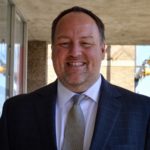 Craig Nash has lived in Waco since 2000. Since then he has worked at Baylor, been a seminary student, managed a hotel restaurant, been the “Barnes and Noble guy,” pastored a church and once again works for Baylor through the Texas Hunger Initiative. He lives with his dog Jane, religiously re-watches the same 4 series on Netflix over and over again, and considers himself an amateur country music historian.
Craig Nash has lived in Waco since 2000. Since then he has worked at Baylor, been a seminary student, managed a hotel restaurant, been the “Barnes and Noble guy,” pastored a church and once again works for Baylor through the Texas Hunger Initiative. He lives with his dog Jane, religiously re-watches the same 4 series on Netflix over and over again, and considers himself an amateur country music historian.
The Act Locally Waco blog publishes posts with a connection to these aspirations for Waco. If you are interested in writing for the Act Locally Waco Blog, please email [email protected] for more information.
(For the other parts of this series, click here: Gardening Waco. — ALW)
By Aime Sommerfeld-Lillard
Let’s talk about gardens. I’ve had a lot of conversations about gardens lately. Backyard gardens, producing gardens, school gardens or community gardens… all kinds of gardens.
Hold on to your seats for this part. Imagine: to some people a garden isn’t food or rows of vegetables!
That realization was a bit hard for me to swallow. I’ll never forget walking along the Texas A&M campus one day with my niece Grace when she said, “Oh, look at that garden!” I saw a 4×4 planting of stoic pansies marching in obedient lines in the middle of a sea of concrete, but she saw a garden. Life changing realization from a 6-year-old! I grew up harvesting vegetables from the garden with my Nonna and taking them to the house for lunch. Grace grew up watching her mom work with roses when her mom had time to spare. To me gardens were (still mostly are) food, and roses are a lot of work for something you can’t even eat. But this experience did make me realize that I was missing a large piece of what it meant to “be a gardener.”
As a researcher studying gardeners, this led me to stretch my thinking. I was curious what it meant to different individuals to be a gardener, or even what images came to mind when someone heard the word “garden.” Were they the same for similar age groups? Did rural vs urban make a difference? This led me down the rabbit hole of attempting a qualitative study looking at reasons people may garden at different stages of their lives. Somewhere along the way that project morphed into hearing stories of some lifelong gardeners and the role gardening played in their lives.
As fascinating as this was (and I sincerely hope I still have those transcripts), it was difficult research to craft a thesis around. So, I moved on to a different study that found adults over the age of 50 who reported themselves to be gardeners, also reported statistically higher quality of life measures. As a researcher this is great!
As I looked closely at the data, there were some interesting trends. Shockingly (to me), once again, these self-selected gardeners were not saying they grew food to eat. Several did grow herbs, but occasionally I would see that a “gardener” simply engaged in what I would call “yard work.” What this highlighted to me is that what a person considers to be “gardening” is highly dependent upon a person’s state of mind or personal perception.
Without looking back at original data from these studies, what I mostly remember is a question asking about earliest memories of a garden. Responses were very family centered, “I was with my mom…”; “I used to help my grandpa…”; “We would always…” The first garden memory was typically a social interaction in the garden, typically a positive memory, there was often learning involved, pride, and there were always details.
I’ve been working with the Carver Neighborhood Family Garden recently. I just love the name they’ve chosen because I feel like it appropriately describes their goal as a garden. A family or group of families is gardening for the neighborhood with the intent to share what they grow with those around them. This group is creating an opportunity for others based on their knowledge, skills, and belief that something like gardening is important. Important enough to spend their own time, funds, and energy to provide a demonstration for others.
Gardening can be a state of mind. It doesn’t really matter what you are producing or the process you are using to achieve your goals. It is most important to have goals, believe in them, share your stories, and – every once in a while – get your hands a little dirty. Assuming the quote is properly attributed I think there is a profound wisdom and a lesson for all in Audrey Hepburn’s statement, “To plant a garden is to believe in tomorrow.”
Take a moment. Think back and recall some of your earliest memories. Think of some of your fondest memories. Take note of how nature plays a part in the details or the setting of some of your fondest memories.
If you recall natural settings or gardens as some of your fondest memories, compare the nature surrounding you at that time with what is available today. Available to ourselves, but also to our children, our parents, our grandparents. How do we as a society provide these important interactions, lessons, and opportunities for growth with those around us and those who depend on us to teach them?
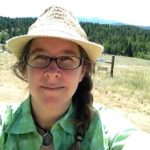 Dr. Aime Sommerfeld Lillard has cultivated a love for nature and gardening through multiple outlets. Dr. Lillard is a Texas A&M graduate with a B.S. in Agricultural Leadership and Development and an M.S. and Ph.D. in Horticulture with a focus on human issues in horticulture. Currently, Dr. Lillard contracts with the Urban Gardening Coalition (UGC) for the Waco Health District’s Farmers Market Promotion Program Grant. She works in the Waco area through the vision of UGC to “strengthen local food production, improve access to healthy food, and empower folks to “grow their own” by creating a coalition that can impact a variety of horticultural education and grow through strategic partnerships.
Dr. Aime Sommerfeld Lillard has cultivated a love for nature and gardening through multiple outlets. Dr. Lillard is a Texas A&M graduate with a B.S. in Agricultural Leadership and Development and an M.S. and Ph.D. in Horticulture with a focus on human issues in horticulture. Currently, Dr. Lillard contracts with the Urban Gardening Coalition (UGC) for the Waco Health District’s Farmers Market Promotion Program Grant. She works in the Waco area through the vision of UGC to “strengthen local food production, improve access to healthy food, and empower folks to “grow their own” by creating a coalition that can impact a variety of horticultural education and grow through strategic partnerships.
(During these last few weeks of December we will be reprising the Top 10 Most Opened Blog Posts for 2018 from the Act Locally Waco blog. I couldn’t possibly pick my favorites – so I used the simple (cop out?) approach of pulling up the 10 blog posts that got the most “opens” according to our Google Analytics. It is an intriguing collection that gives at least a little insight into the interests and concerns of Act Locally Waco readers. I hope this “Top 10” idea inspires you to go back and re-read your personal favorites. There have been so many terrific ones… If you would like to see the Top 10 according to Google Analytics, here’s the link: Top 10 Most Opened Blog Posts of 2018. Merry Christmas! — ABT)
By Caroline Thornton
After graduating from Baylor in 2016, I decided to make Waco my home. I sensed an entrepreneurial movement growing in Waco. I began to see many of my friends – young professionals – were choosing to stay in town. They were staying not just for grad school, but because they saw what this town offered and they saw opportunities to give to the city through their personal and professional lives. This excited every fiber within me! I had always seen what Waco has to offer when you dive head first into involvement in the city.
I decided to join the movement by starting my own business. I started a company called “Second Me.” We offered services to help people do their “to do” lists. I hired college students to work for me and began managing lots of schedules! As it grew I saw the potential it had to become something big. The bigger it got the more I was confident I did not want to be the one to drive it to become a national business. After two years of my company, I felt at peace to find the next thing in my career.
When I decided to put my business to rest, little did I know I would get to be an integral part of making co-working space in Waco a reality.
A little over a year ago I heard a podcast from the founders of a national co-working space company called, WeWork. I immediately felt this concept could be a part of taking the entrepreneur movement in Waco to the next level.
Since graduating I had noticed groups of creative, entrepreneurial people who were enthusiastic about all things Waco. I started immersing myself in several of them. I also noticed that these groups of people didn’t really have a place to call “home” for work. Many are freelancers, have start-up businesses, or work remotely. Being a business owner myself, I noticed how we were all working all over town at different places, but no place existed that allowed us to truly root ourselves and our work.
After making my decision to leave Second Me, I took on a babysitting job and discovered that the dad of the kids I was watching and his business partners were developers in the city. I began talking about our need for a co-working space. I shared articles, podcasts, books, and statistics of what co-working is and why we need it. They agreed. We needed that kind of space in Waco. Coincidentally they, Duelge Holdings, had just purchased their second building downtown on Columbus and 6th street (the first being Mary Avenue Market). They asked me if I would help develop the idea and educate the community on the concept of “co-working,” and then help run the space once it was open.
I eagerly said, “YES!” And, with that, started the most fun part, so far, of my professional journey.
What exactly is “co-working?”
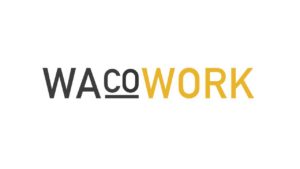 By 2020, 40% of the workforce will be freelancers, independent contractors, and solopreneurs. Collaboration and sharing are growing all around us, partly due to the possibilities created by new technologies and partly due to changes in the current work and corporate structures. Companies are getting smaller, but at the same time more productive and competitive. People are making their work places more collaborative within their companies, and are also breaking the borders by joining other companies. All this is an effort not only to reduce expenses, but to create a more dynamic, creative, and happy workplaces. This is the heart of co-working – to share expenses, but also to be a part of a community that networks and collaborates so everyone benefits from it.
By 2020, 40% of the workforce will be freelancers, independent contractors, and solopreneurs. Collaboration and sharing are growing all around us, partly due to the possibilities created by new technologies and partly due to changes in the current work and corporate structures. Companies are getting smaller, but at the same time more productive and competitive. People are making their work places more collaborative within their companies, and are also breaking the borders by joining other companies. All this is an effort not only to reduce expenses, but to create a more dynamic, creative, and happy workplaces. This is the heart of co-working – to share expenses, but also to be a part of a community that networks and collaborates so everyone benefits from it.
Is this a trend? Will it pass? I don’t think so. Co-working responds to a deep need. The structures of work in our society are changing and with them the needs of workers, namely freelancers and entrepreneurs. Co-working responds to these fundamental changes and will keep growing in cities around the globe – and here in Waco.
Our team has been dreaming together about how to make our space, WACOWORK, the best possible space for helping the entrepreneurial spirit take root in Waco. To us at WACOWORK, it’s creating a collaborative work environment for startups, freelancers, small companies, and remote employees to share resources and ideas as one working community. Our vision for WACOWORK is to see connections, relationships, and opportunities form through our space. We aim for the community within WACOWORK to be dynamic and innovative, exemplifying the power that happens when professionals with all different kinds of businesses work alongside one another. The aesthetics of the WACOWORK space reflects the connectivity, creativity, and productivity we hope to stimulate — its a bit quirky to help make every day at the office a memorable one.
WACOWORK is going to be a place for taking big risks and doing things that are a little off-kilter. We aim to house members that are bold, innovative, and welcoming. Waco is a city ripe with opportunity, and I cannot wait to unearth all of the exciting things to come through Waco’s first coworking space, WACOWORK.
If this sounds like something you think would work well for your entrepreneurial venture, feel free to contact me at 254.304.9368. Hit me up, let’s get coffee, I want to meet you!
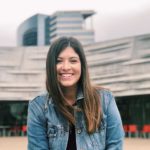 After graduation from Baylor in 2012, Caroline Thornton decided to stay in Waco. Seeing the opportunity for some creative endeavors, she first opened “Second Me” a company that aimed to do peoples’ to do lists – from running errands to tasks around the house. Here next venture it to help manage the “WacoWork” coworking space at 600 Columbus Avenue Suite 106. She encourages everyone she meets to take a chance – be a creator in Waco, not just a consumer!
After graduation from Baylor in 2012, Caroline Thornton decided to stay in Waco. Seeing the opportunity for some creative endeavors, she first opened “Second Me” a company that aimed to do peoples’ to do lists – from running errands to tasks around the house. Here next venture it to help manage the “WacoWork” coworking space at 600 Columbus Avenue Suite 106. She encourages everyone she meets to take a chance – be a creator in Waco, not just a consumer!
(Tami Nutall Jefferson, a married mother and grandmother, is going back to school and she has invited us all along to enjoy the ride. For more posts in this series, click here: Tami’s Big Do Over. – ALW)
By Tami Nutall Jefferson
Everyone has one – the famous, the infamous, the invisible ones. I struggled with my -Er all last year. I committed myself to many things that ended up falling through my over-committed cracks. Things that sounded good, fun, or offered certain opportunities, but weren’t true to my -Er; even though I hadn’t defined that yet. And then, on Black Friday, the Universe turned off the little switch that makes my motor run non-stop. The depression was as overwhelming as the desire to do nothing. But I didn’t have that luxury because I started working in the most soul-sucking job ever on Cyber Monday. Going to that desolate place every day birthed an intense desire and drive within me to truly discover my -Er, because that was not it.
Really Tami?
What truly is my -Er? What am I going to school for? What am I volunteering for? What am I doing any of this for? But my biggest question after completing my first semester was “now that I’ve attained the ONE thing that I’ve always (getting into Texas A&M) and I’ve done the ONE job I’ve always wanted to do (designing buildings), what if my -Er is starting to change? You know, that feeling you have inside when you feel like “maybe I want something different now” but you can’t really quantify it and you feel like a total nimrod at the thought of changing it. And that other shoulder-sitter is saying “Really? Now?? You want to change NOW?” That was me.
And So The Journey Begins
One thing the Holy Spirit had been softly saying to me is that everybody has an -Er and I needed to find mine. So, I set out on my journey to find my -Er. I began to look around and see what that looked like in other people’s lives. I came across an article in Fast Company and noticed an -Er pattern. While I’m going to college to do an -Er job, I noticed the -Ers of highly successful people seem to stem from their core missions, not their job titles or functions. Cases in point:
- Denise Morrison – CEO of Campbell’s Soup / Lead-er
- Joel Manby – CEO of Herschend Family Entertainment / Lov-er
- Oprah – CEO of OWN / Teach-er
- Richard Branson – Founder of The Virgin Group / Encourag-er
- Amanda Steinberg – Founder of DailyWorth.com / Cultivat-or
Most of us know some of these people and what their -Er jobs are, but their true -Ers are actually the baseline for their careers, lifestyles, their hobbies, activism…their everything – it’s the string that connects all the dots. Looking closer at Oprah, she states that “she wanted to be a teacher, but…never imagined it would be on TV.” Whether, it’s her talk shows, her school for girls, her magazine – the one foundational principle of Oprah, is that she’s teaching (or making it possible for others to teach) something to her audience.
Richard Branson is my role model. If you follow his blog or social media or press, you notice that he’s famous for two things – fun and encouragement. He’s mixed the two to create an empire of over 150 companies. Dig deeper and you find out that those companies are not companies he’s started or led, but they’re companies created with ‘normal’ entrepreneurs who he believes in and encourages to pursue their dreams as part of the Virgin network with Virgin cash, while business is always focused on happiness and people.
For the people on my list, their -Ers are actually their vehicles for fulfilling their purposes and missions. When you know your purpose and mission in life – or even for that year – you’re able to better and quickly define what your -Ers are, and what you say yes and no to.
Those Little Voices
For the last 6 months, in the back of my mind I’ve heard Katt Williams’ voice screaming “you got to be in tune with your star player.” I decided to make this my personal and professional mission for 2018 – to get in tune with my star player. But, again, that brings me back to my life’s mission. If your star player is the person that makes that life mission happen, then they need to know what the mission is.
And that brings me to the words of one of my favorite teachers, Dr. Myles Munroe and his “Recognize Your Vision & Dream” lesson (available on YouTube). After much listening, deliberation, self-assessment, lifestyle design, I finally settled on a mission that I believe will carry me through life, help me fulfill my purpose, and frame my -Ers for decades to come. It simply is “To be a person of value, wealth, and influence, so I can create the things that people need, want, and love” Sprinkle that with my Psalm 37:4 heart-desires (real estate and fun), and it circles right back to where I am in this season in my life. So, although, my -Ers may change in the near future, I can happily rest in that they will all fit in the grand scheme of things. And that my current -Er of “older undergrad student” is but for a moment.
The Price of College
I chose a major with an emphasis in Urban Planning – but I know that I do not want to work with the City for life in the planning department. My dream is to be a modern space builder & developer in Waco (no small feat). This semester I have three classes – two in urban planning and one in modern architecture. So, when my professors asked last week what I hope to get out of class, my honest answer was to learn from the basics of each subject and how I fit in the industry as a developer – considering my minors are tourism and event planning.
On day 1, in one of my urban planning classes, I watched the 17 minute ‘What is a City’ lecture video where my professor explained the connection between physical and social landscapes of cities. I had to immediately email him and tell him about my “fit” struggle, but how he in a matter of 10 minutes, managed to bring it all together and connect the dots for me and prove to me that I don’t have business-ADD — all in the first lecture. For the first time in life, I could clearly see the connection between the physical spaces and the social interactions that I long to create for people and how they connect in the real world – not just my mind. And now, I know that it does make sense, and it is possible. I can be a real estate developer, fun-maker, and place-maker all in one day!
I learned that day that the price of college is not how much you pay for it, but rather how much you lose in life – time and money and hope and fear – because of not being in the room with people having those conversations that feed your dreams, desires, knowledge, purpose, and mission. It’s too high of a price to pay.
 Tami Nutall Jefferson is an older, non-traditional student with a professional real estate background. Tami begins her first academic year at Texas A&M University pursuing a Bachelor’s Degree in Urban Planning and Land Development while commuting between Waco and College Station. Her hope that every Wacoan – from all corners – can engage in and contribute to the growth and success of the city. You can connect with Tami at [email protected] or on Facebook at https://www.facebook.com/tami.nutall1
Tami Nutall Jefferson is an older, non-traditional student with a professional real estate background. Tami begins her first academic year at Texas A&M University pursuing a Bachelor’s Degree in Urban Planning and Land Development while commuting between Waco and College Station. Her hope that every Wacoan – from all corners – can engage in and contribute to the growth and success of the city. You can connect with Tami at [email protected] or on Facebook at https://www.facebook.com/tami.nutall1
By Angelo Ochoa
It’s Eight o’clock…. Do you know where your kids are?
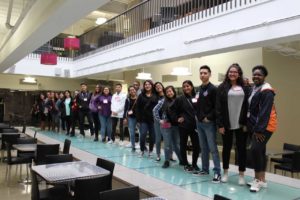 If you were to ask this question to parents of the students in the Academy of Business and Finance at University High School, the answer would be easy. “Yes I do. They are still at school preparing income tax returns for the community.”
If you were to ask this question to parents of the students in the Academy of Business and Finance at University High School, the answer would be easy. “Yes I do. They are still at school preparing income tax returns for the community.”
This year will mark the 14th year for a tax program that a lot of folks in the Waco community have been taking advantage of for years, many since the beginning. But, this is not your average, ordinary, everyday income tax site for two very important reasons.
- All of the services are provided FREE of charge.
- It is run by the students of the Ron E. Smith Academy of Business and Finance at University High School.
So, here is some background….
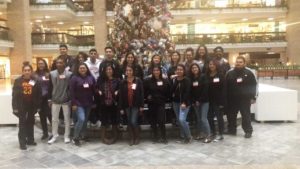 In 2004, Ms. Angela Reiher, then assistant principal at A.J. Moore Academy, and Mr. Ron Smith, a teacher in the school’s Academy of Finance, contacted the IRS about opening up a VITA (Volunteer Income Tax Assistance) Site at the school. The IRS, who provides the tax software and the Site Identification Number for e-filing purposes, offered to help as long as the school could guarantee to prepare at least a hundred returns. The goal of the IRS’s VITA program is to offer free tax help for low to middle income people, persons with disabilities, those who speak limited English, and the elderly. To everyone’s surprise, the students of the Academy of Finance were able to prepare over 300 tax returns the first year! And, what started out as a creative way for students to put into practice what they were learning in the classroom, has only grown larger each year. In fact, in the thirteen years since our doors opened, our students have completed over twenty-two thousand tax returns totaling over thirty-nine million dollars in refunds for the Waco community. What makes this so meaningful is that these, often much needed refunds are directly deposited in local banks and credit unions and are spent right here in the Waco community at local business.
In 2004, Ms. Angela Reiher, then assistant principal at A.J. Moore Academy, and Mr. Ron Smith, a teacher in the school’s Academy of Finance, contacted the IRS about opening up a VITA (Volunteer Income Tax Assistance) Site at the school. The IRS, who provides the tax software and the Site Identification Number for e-filing purposes, offered to help as long as the school could guarantee to prepare at least a hundred returns. The goal of the IRS’s VITA program is to offer free tax help for low to middle income people, persons with disabilities, those who speak limited English, and the elderly. To everyone’s surprise, the students of the Academy of Finance were able to prepare over 300 tax returns the first year! And, what started out as a creative way for students to put into practice what they were learning in the classroom, has only grown larger each year. In fact, in the thirteen years since our doors opened, our students have completed over twenty-two thousand tax returns totaling over thirty-nine million dollars in refunds for the Waco community. What makes this so meaningful is that these, often much needed refunds are directly deposited in local banks and credit unions and are spent right here in the Waco community at local business.
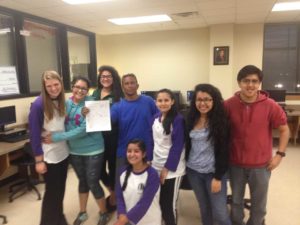 As a teacher, I often try to put myself in the shoes of these students and ask myself if I was the kind of high school kid who would have stayed after school and volunteered until late in the evening preparing taxes for complete strangers. I have never gotten an answer that I liked that wasn’t me lying to myself.
As a teacher, I often try to put myself in the shoes of these students and ask myself if I was the kind of high school kid who would have stayed after school and volunteered until late in the evening preparing taxes for complete strangers. I have never gotten an answer that I liked that wasn’t me lying to myself.
Ruth Rodriguez, a senior, who also volunteers in the Trojan Branch of Educators Credit Union located on the University High School campus has been a part of the tax program since she was a freshman. She has completed over 305 hours of community service and she is the first smile you see when you walk in the door. She says, “My main job here at the tax site is to sign people in and verify identification and social security cards. Probably my favorite part of what I do is getting to meet new people. Most of the people we help are really grateful for the service we provide, and even though I don’t really know them they seem to really want me to do good things with my life. They love to offer advice on what I should and shouldn’t do once I graduate from high school. As a freshman I was afraid to talk to adults, other than teachers or my family, and usually not even them, now I feel confident in answering their questions, explaining their tax returns to them and listening to stories about the struggles of being an adult.”
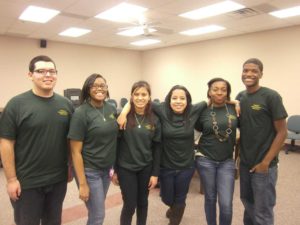 Shelby Reyes, a senior, who also volunteers at the Trojan Branch of Educators Credit Union and who has over 347 volunteer hours, echoed Ruth’s thoughts, but Shelby’s roots in this program run a little bit deeper. “My sister, Jennifer, also did taxes in this program from 2008 to 2012 when it was still A.J. Moore Academy,” she says. “My sister always enjoyed being in business classes and doing taxes and I can see why. The Academy of Business and Finance has really helped me throughout high school to decide what I want to do with my life. Doing taxes has become a passion for me because I just love helping people. I started doing taxes as a 9th grader. I was scared at first because, honestly, who would think a high school freshman could do someone’s taxes and not mess them up. My teachers, Mr. Ochoa and Mrs. Moore, did a good job preparing us and they were always there to help out and the people getting their taxes done are usually really patient. I stayed as often as I could because I love hearing people’s stories about their successes and failures in life…people love to tell their stories. There are always interesting people that come in and you never know what or who each night might bring. Every year there is this man that comes in with big bamboo sticks and tells all of the kids what a great job we are doing and that we’re all ‘lookin’ stylish.’ Before he leaves he always holds up those big sticks and prays over us and the school. I’m going to miss seeing him every year after I graduate.”
Shelby Reyes, a senior, who also volunteers at the Trojan Branch of Educators Credit Union and who has over 347 volunteer hours, echoed Ruth’s thoughts, but Shelby’s roots in this program run a little bit deeper. “My sister, Jennifer, also did taxes in this program from 2008 to 2012 when it was still A.J. Moore Academy,” she says. “My sister always enjoyed being in business classes and doing taxes and I can see why. The Academy of Business and Finance has really helped me throughout high school to decide what I want to do with my life. Doing taxes has become a passion for me because I just love helping people. I started doing taxes as a 9th grader. I was scared at first because, honestly, who would think a high school freshman could do someone’s taxes and not mess them up. My teachers, Mr. Ochoa and Mrs. Moore, did a good job preparing us and they were always there to help out and the people getting their taxes done are usually really patient. I stayed as often as I could because I love hearing people’s stories about their successes and failures in life…people love to tell their stories. There are always interesting people that come in and you never know what or who each night might bring. Every year there is this man that comes in with big bamboo sticks and tells all of the kids what a great job we are doing and that we’re all ‘lookin’ stylish.’ Before he leaves he always holds up those big sticks and prays over us and the school. I’m going to miss seeing him every year after I graduate.”
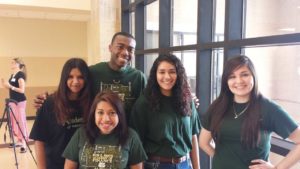 Student opinions about the program all seem to be pretty similar. “I love when people give me advice.” “I love helping out the newer students who might be a little scared.” “I love that people need my help doing something difficult that can impact their lives.” “I’ve learned that people can be very different. Some can be rude and some can be kind and patient and when I grow up I get to decide which of those I want to be.” The one phrase that is typically heard most during tax season is, “What are we eating tonight?” As student volunteers, these kids literally ‘will work for food’. So naturally we have more volunteers on the nights we are eating hot wings than the nights we are having ham sandwiches. We have been very fortunate, in the past, to receive donations from many local restaurants and churches, as well as donations and grants from the community to help feed the kids, but it continues to be a struggle.
Student opinions about the program all seem to be pretty similar. “I love when people give me advice.” “I love helping out the newer students who might be a little scared.” “I love that people need my help doing something difficult that can impact their lives.” “I’ve learned that people can be very different. Some can be rude and some can be kind and patient and when I grow up I get to decide which of those I want to be.” The one phrase that is typically heard most during tax season is, “What are we eating tonight?” As student volunteers, these kids literally ‘will work for food’. So naturally we have more volunteers on the nights we are eating hot wings than the nights we are having ham sandwiches. We have been very fortunate, in the past, to receive donations from many local restaurants and churches, as well as donations and grants from the community to help feed the kids, but it continues to be a struggle.
Before a student can volunteer at a VITA site, even if they are just holding the door or passing out pencils, they are required to be certified through the IRS. This is not an easy task to complete and ultimately, it is up to them to decide if they want to volunteer. It is not a requirement and their grade is not affected by it. For them, the reward is the activity itself. The students know that if they were not here to help, people might have to pay someone for this service. They are at this great place between childhood and adulthood where they have not yet started to become motivated by their own economic self-interests. For the kids in this Academy, we have to remind them that actions always speak louder than words, especially those actions that honor themselves, their families, their school, and their community.
As a teacher, there is nothing more rewarding than seeing a timid freshman, scared of the world, doing their first tax return for a complete stranger grow into a senior, beaming with confidence, and explaining to a customer the difference between standard and itemized deductions.
It is really impossible to describe just how beneficial this is to the students at University High School. From a very young age we place a lot of expectations on students with their only rewards being good grades and an assurance from an adult that, “it’s important to your future.” This doesn’t always work, and in my experience, sometimes rewards can often produce less of the very things we are trying to encourage. I have noticed that, while they are volunteering, the students get to experience something they do not often get every day… gratitude. Overwhelming gratitude from the people they are helping. It is not often a high school student gets to hear, “Thank you, thank you for being here and helping me with this. You have no idea how much this means to us.” Our students get to hear it many times a night.
I am not sure exactly what it is that keeps these students excited about staying and doing taxes in the evenings. Whatever it is, their motivation comes from somewhere deep within. From a part of themselves that has a desire to serve others and finds joy in doing that work. It is not just about athletics and academics. It is about integrity, building good character, and nurturing the hearts and minds of students that want to go out into the world and change it for the better.
If you would like more information about our program, please visit www.uhstaxes.com.
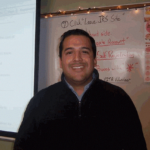 Angelo Ochoa teaches Financial Analysis, Accounting 1, and Income Tax Accounting for the Ron E. Smith Academy of Finance at University High School. He was formally with Central National Bank before taking the opportunity to teach business courses at A.J. Moore Academy. He is in his 8th year with Waco ISD and serves as the Site Coordinator for the school’s Volunteer Income Tax Assistance site.
Angelo Ochoa teaches Financial Analysis, Accounting 1, and Income Tax Accounting for the Ron E. Smith Academy of Finance at University High School. He was formally with Central National Bank before taking the opportunity to teach business courses at A.J. Moore Academy. He is in his 8th year with Waco ISD and serves as the Site Coordinator for the school’s Volunteer Income Tax Assistance site.
By Ivy Orr Hamerly, Christina Chan-Park, and Rebecca McCumbers Flavin
In 1920, 20 million new voters won the right to vote. That same year, the League of Women Voters began helping these new voters learn how to exercise their voting rights. Almost 100 years later, the League of Women Voters is still protecting democracy and empowering all voters.
After the 2016 election, we looked for a way to be more politically active while still bringing people together and uniting around shared values and concerns. We found the the League of Women Voters does exactly that. We are inspired by the work that the LWV does to “empower voters” and “defend democracy.” This mission speaks to our calling as educators and involved citizens.
The Waco chapter of the League of Women Voters was active for many decades, but had been dormant for the past few years. In 2017, we revived the Waco chapter, and the LWV of Texas generously provided training and moral support. The W.R. Poage Legislative Library hosted our earliest meetings and is co-sponsoring our candidate forum next month. Our fellow Wacoans invited their friends, distributed voter guides for the 2017 Texas election, learned how to register voters, and more.
One of the things we like about the League is that it is strictly non-partisan and neither supports particular parties nor endorses specific candidates. This does not mean that the League is apolitical. The national and state Leagues are among the most effective grassroots organizations in the United States. The League lobbies Members of Congress and state legislatures about various issues ranging from voting rights to campaign finance reform to environmental sustainability. Both the national and Texas Leagues have websites that provide a wealth of information and tools for all citizens.
Who can join League of Women Voters?
 That’s easy – everyone! The League is open to men and women of all ages who want to learn more about our democratic processes and be more civically engaged. Whether you have never voted or have never missed an election, the League is for you. We welcome Wacoans of all political parties as well as those who identify with no party at all.
That’s easy – everyone! The League is open to men and women of all ages who want to learn more about our democratic processes and be more civically engaged. Whether you have never voted or have never missed an election, the League is for you. We welcome Wacoans of all political parties as well as those who identify with no party at all.
What kind of work is the League of Women Voters-Waco doing right now?
Voter education
Candidate Forum: To help Wacoans prepare for the primary election on March 6, we will hold a candidate forum on Tuesday, February 13, at 5:30 PM at the Texas Rangers Hall of Fame. All candidates running for McLennan County Judge, Criminal District Attorney, and Precinct 2 and 4 Commissioner have been asked to participate in this event. The format will be speed-meeting, so everyone who attends will have a chance to meet all the candidates.
Voters Guide: We are writing a non-partisan voters guide for the general election in November. We are working with the LWV-Texas to make sure Waco voters have unbiased information about candidates for local, state, and federal offices.
Voter registration and turnout
Voter Registration Drives: On Saturday, January 27, we will have registrars on-site from 10 AM – 2 PM at the Old Navy at Central Texas Marketplace and from 12 PM – 4 PM at the West Waco Library. If you are not yet registered in McLennan County, or if you need to update your registration, stop by and let us help you.
Voter Turnout: We will also have more information about early voting days, times, and locations at our tables.
LWV Membership:
Our next chapter meeting will be Saturday, February 17th at 10:00 AM at the South Waco Library. Join us at the meeting to find out more about LWV and our chapter’s events and plans.
Follow us on Facebook to learn about voting rights and voter education on the local, state, and national level. Join the 200+ people who liked/followed our page in 2017. We hope to add 100 more in 2018. Search for League of Women Voters of Waco (@lwvWaco).
If you are not a Facebook user, contact us at [email protected] to join our email list.
How can you get involved in League of Women Voters of Waco, and how much time does it take?
The level of commitment is up to you! You can simply like us on Facebook or become involved in planning an event.
Why should you join us?
We need you, and Waco needs the League! We can work together as neighbors to serve our community today. We can hold our leaders accountable. We can educate ourselves on the issues. We can make democracy work.
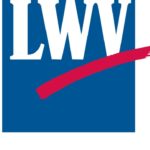 Ivy Orr Hamerly is the Coordinator of LWV-Waco. She is a Senior Lecturer in Political Science at Baylor University where she teaches Comparative Politics and researches legislative oversight of executive leaders.
Ivy Orr Hamerly is the Coordinator of LWV-Waco. She is a Senior Lecturer in Political Science at Baylor University where she teaches Comparative Politics and researches legislative oversight of executive leaders.
Christina Chan-Park is the Co-Communicator of LWV-Waco in charge of voter education. She is the Science Librarian at Baylor University where her research focuses on scholarly communications, specifically data management, bibliometrics, and academic identity.
Rebecca McCumbers Flavin is the Co-Communicator of LWV-Waco in charge of voter registration and turnout. She is a Senior Lecturer in Political Science at Baylor University where she teaches courses in American constitutional law, Model United Nations, political philosophy, and politics and religion.
(During these last few weeks of December we will be reprising the Top 10 Most Opened Blog Posts for 2018 from the Act Locally Waco blog. I couldn’t possibly pick my favorites – so I used the simple (cop out?) approach of pulling up the 10 blog posts that got the most “opens” according to our Google Analytics. It is an intriguing collection that gives at least a little insight into the interests and concerns of Act Locally Waco readers. I hope this “Top 10” idea inspires you to go back and re-read your personal favorites. There have been so many terrific ones… If you would like to see the Top 10 according to Google Analytics, here’s the link: Top 10 Most Opened Blog Posts of 2018. Merry Christmas! — ABT)
Answering a call to provide compassionate care to those in need
by Paige Reinke
When I think about what led me to a career in healthcare, I can’t help but think of the time I spent in a pharmacy growing up. My mom worked in a pharmacy, and I always enjoyed science and health classes in school, so becoming a pharmacist seemed like a natural fit. It wasn’t long before I realized that my desire to help others made becoming a pharmacist more than just a career path, it was a calling.
Our Mission calls us to serve all persons with special attention to those who are poor and vulnerable, to provide care that sustains and improves the health of individuals and communities and to be advocates for a compassionate and just society—and that is what Ascension Medical Mission at Home is all about.
Multiple barriers prevent many in our community from getting the care they need, especially dental and vision services. Ascension Medical Mission at Home offers free health, social and support services to those who might not otherwise have access. It’s also more than just a day of free healthcare. This event helps establish patients with follow-up care and connects them to various resources available in our community.
For our first Ascension Medical Mission at Home in 2016, I served on the steering committee. I knew it would be a lot of work, but that it would be worth it. I also knew this special day of care would make a difference in the lives of many, but the impact extended far beyond what I had imagined.
A well-orchestrated team of over 600 associates and community partners worked in harmony to bring this day of free care to our community. We provided medical, dental and vision services to nearly 1,000 people.
I was humbled by the stories of gratitude that quickly began flowing in: a woman who had been struggling with pain from an infected tooth for three years, got it pulled; a dad who had been saving for months to buy his son glasses got them for free; women who received mammograms for the first time; many who got prescriptions they needed to improve health, enhancing their quality of life.
When asked to serve on the steering committee again for this year’s event, I jumped at the chance. No doubt, this experience will forever be imprinted on my heart, as my life was enriched just as much as it enriched the lives of those we served. I feel so fortunate to be a part of something so big and look forward to serving our community again on January 27. (Here’s a link to the flyer in English and Spanish.)
The Waco Convention Center will be turned into a medical arena, outfitted with medical bays, a pharmacy, and areas for spiritual care, and vision and dental services. Patients will be served on a first come, first served basis. Registration will go from 8:00 a.m. to 3 p.m. The following services will be provided for free, no insurance necessary:
- Medical care for the entire family
- Dental for adults only
- Vision for the entire family – Child prescriptions will be filled on-site while adult prescriptions will be mailed or delivered to a pre-designated location.
- Spiritual Care – Prayer partners will roam the facility to pray with the patients but will also have a more private area for more serious discussions
- Foot washing – In the spirit of representing Jesus, we will provide a foot washing, toe nail trimming and foot massage to all who wish to participate.
- Diabetes screenings for adults only
- Breast Health Exams
- Lab Services – Full lab services provided
- Pharmacy – Prescriptions filled at the event
- Shoes and Socks – during triage, patients will be assessed for the need for new shoes
- Flu Vaccines – adults only
- Food – volunteers will be passing out water, fruit or granola bars to patients. Caritas will also be on-hand to distribute food and provide resources for the future.
- Community Services – Community resources will be on-hand to assist patients with personal or family needs.
Other Ascension sites across the nation have held medical mission events in their communities. This is the fifth Ascension Medical Mission at Home event in Texas. Ascension’s Seton Healthcare Family in Austin has hosted three. To see the impact of our first Ascension Medical Mission at Home event in Waco, watch this video. For more information go here.
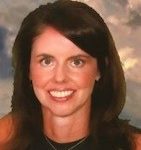 Paige Reinke, Pharm.D., is the Clinical Coordinator in the pharmacy department at Providence. Providence is part of Ascension, the largest nonprofit health system in the U.S. and the world’s largest Catholic health system. Her main responsibilities are managing the pharmacy clinical programs at the hospital and antibiotic stewardship. She earned a doctorate of Pharmacy degree from the University of Texas. She met her husband, David, in pharmacy school and he is also a pharmacist at Providence. They have two children who attend school in China Spring.
Paige Reinke, Pharm.D., is the Clinical Coordinator in the pharmacy department at Providence. Providence is part of Ascension, the largest nonprofit health system in the U.S. and the world’s largest Catholic health system. Her main responsibilities are managing the pharmacy clinical programs at the hospital and antibiotic stewardship. She earned a doctorate of Pharmacy degree from the University of Texas. She met her husband, David, in pharmacy school and he is also a pharmacist at Providence. They have two children who attend school in China Spring.
By Josh Caballero
Most of us have picked up a book to read to or with someone else at some point in our life. We have read to our children, younger siblings, nieces and nephews. We have grabbed the newspaper or our phone and read a section to our spouse, colleague or friend. We can remember grabbing a book and reading along in school as a teacher read to us. These simple moments seem exactly that—simple. Yet we often forget this when we are asked to consider volunteering to read to children at a school. We think it takes a certain type of person with some sort of specialty in reading and other skills that we don’t have. We think, “I don’t have a teaching background or know how to work with kids. I wouldn’t know where to begin to help children improve their reading.”
If I’m honest, I’m not sure that I often know where to begin when helping a kid to read, but I can tell you what it looks like for me and the volunteers Waco CDC works with at various campuses:
Every week, one day a week, I take my lunch break to drive to West Avenue Elementary School. I arrive and say hi to the clerk in the front office and get signed in. Then I go to the counselor’s office to select books for my group to read. Once I have the books selected, I go to the cafeteria to wait on my students to grab their lunch. When they see me, they smile and wave and move to the front of the line. After they have their lunch trays we go to our reading area. We sit down and as they eat their lunch, they talk about things that are happening that week, what they’re learning in school, and what they think the book I’ve picked for us will be about based on the cover. Once we’ve done this we begin to read while they finish eating. Usually, we take turns reading. If they struggle at certain points I help them to slow down, sound out different words, and teach them the definition of words they haven’t read before. Sometimes I read to them and have them follow along. Other times they do all the reading. We’ll work on recognizing words on flash cards or make up our own story with the pictures in the book. When our time is up, we go back to the cafeteria to throw away their lunch trash and they join their classmates to go back to class.
Right now, there are almost 20 mentors reading at West Avenue Elementary School, more than 70 at Brook Avenue Elementary School, and nearly 10 at JH Hines Elementary School. The reality is that it does take a very specific type of person with a particular skill set to be a reading club volunteer. It takes a caring adult who is willing to be committed to give up a small portion of their time each week to get to know a kid while they sit and simply read together. If this sounds like you and you’re interested in being a reading club volunteer, please contact Josh Caballero at [email protected]
If you would like more information about mentoring opportunities in Waco, don’t hesitate to reach out to Jillian Jones with the Prosper Waco team. You can contact her by sending an email to [email protected], or completing this form on the Prosper Waco website.
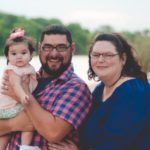 Josh Caballero is a community organizer in North Waco for Waco Community Development and works closely with local schools, churches, businesses, and residents in the Brook Oaks and Sanger Heights neighborhoods. Originally from the panhandle of Texas, Josh has been a Wacoan for 12 years and enjoys living in the Sanger Heights neighborhood with his wife Jennifer and daughter Millee Grace.
Josh Caballero is a community organizer in North Waco for Waco Community Development and works closely with local schools, churches, businesses, and residents in the Brook Oaks and Sanger Heights neighborhoods. Originally from the panhandle of Texas, Josh has been a Wacoan for 12 years and enjoys living in the Sanger Heights neighborhood with his wife Jennifer and daughter Millee Grace.
By Melody Terrell
Are you worried about children in your family with learning challenges? Have you been frustrated over the lack of services in the schools? It’s time to forget those past experiences. Today is the day to head back up to the schoolhouse for a word with the teacher, counselor, or principal. Our schools want to do the right thing and now is a great time to ask again. Texas is in the news (again) for problems related to identifying and serving children with disabilities. This sounds like bad news, but there is good news that goes with it.
We can’t change the past, but as a veteran teacher and instructional specialist, I know the schools are full of good people who want to help your child. No one goes into education to do an ‘okay’ job. We all start starry-eyed and eager. Education professionals are mostly doing the best they can with what they’ve got. Frustration with suggested “caps”, lack of funding, and inconsistent direction has stalled the quality of services for students. Problems with identification and services can change based on the attention this issue is getting in Texas right now.
Conditions that qualify for special education include autism, blindness, deafness, emotional disturbance, hearing impairment, intellectual disability, multiple disabilities, and orthopedic impairment. But there’s more. Some children do not qualify based on those categories but have other conditions which affect a life activity. ADHD and Dyslexia are high frequency disabilities that certainly affect life activities such as reading, learning, and/or caring for self. These children may qualify for other protections under the law. Section 504 of the Rehabilitation Act of 1973 requires that the needs of students with disabilities be adequately met. Section 504 of this important document requires public school districts to provide a ‘Free Appropriate Public Education’ (FAPE) including identification, appropriate needed services in regular or special education, and related aids to help with learning.
I am most familiar with dyslexia. The International Dyslexia Association estimates that 1 in 5 people are born with this brain-based learning difference. Dyslexia, a print-based learning difference, is seriously under-identified in Texas. Students with dyslexia need classroom accommodations and multi-sensory structured language lessons. Small group tutoring is not the same remediation. This translates to money spent on training and a strong core of professionals to provide this service. Done well, this 2-3 year service can make a lifetime of difference to a non-reader. Simple accommodations such as photographing assignments on the board with a smart phone are easy. Pen devices that scan and read lines of text cost more, but offer independence and dignity for the individual. Other conditions have similar services and learning aids which can help if supported by The Texas Education Agency and school administrators.
How we treat students with disabilities is in the news. The governor and the Texas Education Agency are on it. Traditional public schools and public charter schools will be taking a close look at improving. Private schools are not held to the same requirements, but many in the Waco area are faith-based. Perhaps there will be conversations about ministry to families who feel beaten down by learning differences.
The most important adult in this mix is the parent or guardian. If you have been asking for help, keep asking. Send a letter to the principal then to the director of special education if you are not getting help. Always try to work with the school first and remember that you are on the same team. It can be frustrating, but do not stop asking questions and seeking help. Your child’s future depends on it. School attendance alone will not help a child with a learning disability succeed. The right intervention and classroom support can be incredibly effective.
For more information:
- U.S. Department of Education – “Protecting Students With Disabilities” – https://www2.ed.gov/about/offices/list/ocr/504faq.html
- Texas Education Agency Dyslexia Handbook 2014 – https://tea.texas.gov/academics/dyslexia/
- International Dyslexia Association – https://dyslexiaida.org
- Learning Disabilities Association – https://ldaamerica.org
- Academic Language Therapy Association – https://www.altaread.org
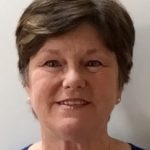 Melody Terrell is a retired public educator and a part-time private dyslexia therapist. She is certified in special education and gifted education. She is the parent of grown children with learning differences who now advocate for themselves.
Melody Terrell is a retired public educator and a part-time private dyslexia therapist. She is certified in special education and gifted education. She is the parent of grown children with learning differences who now advocate for themselves.
By Major Anita Caldwell
My husband and I left the USA to serve oversees with The Salvation Army in 2001. When we left, The Salvation Army was well loved and respected for the care and compassion shown to those experiencing homelessness. Upon our return, I have wondered if attitudes have changed. I am worried that our national attitude toward “the least of these” has drifted from care and compassion to irritation and impatience. I hope our community can avoid following this trend.
A truly prosperous city has room for all people, it is a city that not only celebrates its success stories but embraces those who are struggling. I hope that as our own city becomes popular and prosperous we are careful not to turn our backs on “the others,” but to open our arms.
The Salvation Army is one of the access points for Waco’s Coordinated Entry Program for homeless families. We are a part of a network of resources available in Waco. Those seeking shelter can come to the Salvation Army to be assessed as to which local program will best serve their need.
When we encounter a person suffering from mental illness, for example, we may refer them to the MHMR PATH program where they are interviewed for appropriate assistance. Sometimes we encounter homeless veterans who just can’t bring themselves to sleep inside. They end up sleeping beside our building which they consider to be a safe place. We connect them to veteran services and the Veteran’s Hospital.
Our primary goal at Salvation Army is homelessness prevention. If a family has an eviction notice, and we have available funds, The Salvation Army can work with the landlord, pay the rent and stop the eviction. This fall, for example, I sat in my office with Helen*, a hard-working mother of one child who works two jobs to pay her bills. Together we reviewed her income and expenses. She concluded that she would need to give up her new car because she simply could not afford the payments. Conversations such as these, also called case management, are a common everyday occurrence at The Salvation Army in each of our programs. We help find the root of the problem and encourage change that sets people free of needing help from others.
If the family is already homeless, we have three small rooms at Sally’s House, The Salvation Army Emergency Shelter for homeless women and homeless families. Our goal is to educate, encourage and support these families as they get employment and move to their own apartments with rapid rehousing funds. Once in their apartments, we continue to have case management conversations that encourage successful changes and help them shift from dependence to independence.
The Homeless Management Information System data from the City of Waco, during three months this past fall, showed that 95 percent of people assisted by The Salvation Army are McLennan County residents – people of this county, this city. These are God’s children who have lost their way. They could be your parent, your spouse, your sister or brother, or your child. They definitely need more services than a meal, and that’s where The Salvation Army asks the harder questions and seeks to find the real answers.
On a recent warm fall evening, I threw a plastic table cloth on the deck of Sally’s House. Three children gathered with their moms as I gave them each paint, brush and canvas. Little wide-eyed Bobby* immediately went for the black and dark colors. You see, this was his first night at the shelter and there were many uncertainties in his little life. It took several words of encouragement before he looked over at Jason’s* painting and decided to go for the brighter colors of green and blue. Jason, on the other hand, painted joyfully. His picture included an open green field, blue sky and bright sun. You see, Jason and his mom had found safety and protection at Sally’s House from a domestic violence situation. Jason’s life was full of hope and happiness.
No matter how society has changed we still know that Jesus calls us to give the cup of cold water to the thirsty and care to the prisoner, the orphan, the widow… the neediest of Waco. He calls us to be the good Samaritan and to take those we find wounded and hurting to the Inn. That’s why we remain steadfast in our mission.
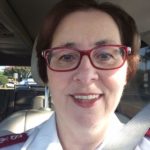 Major Anita Caldwell was born in Olean, NY, to a family of ministers. She attended and graduated from Kentucky Mountain Bible Institute with a BA in Religion. Her MA is in Pastoral Leadership from Olivet Nazarene University. She and her husband, Bradley Caldwell are Majors in The Salvation Army and are Regional Coordinators for this area. They have served as ministers of the gospel in The Salvation Army for 24 years. After serving in three USA appointments, they were transferred as Regional Leaders in Moldova, Romania, Russia and the country of Georgia over a twelve-year period. They received their Waco assignment after serving at International Headquarters in London, UK.
Major Anita Caldwell was born in Olean, NY, to a family of ministers. She attended and graduated from Kentucky Mountain Bible Institute with a BA in Religion. Her MA is in Pastoral Leadership from Olivet Nazarene University. She and her husband, Bradley Caldwell are Majors in The Salvation Army and are Regional Coordinators for this area. They have served as ministers of the gospel in The Salvation Army for 24 years. After serving in three USA appointments, they were transferred as Regional Leaders in Moldova, Romania, Russia and the country of Georgia over a twelve-year period. They received their Waco assignment after serving at International Headquarters in London, UK.
The Act Locally Waco blog publishes posts with a connection to these aspirations for Waco. If you are interested in writing for the Act Locally Waco Blog, please email [email protected] for more information.
*Names changed throughout to protect privacy.
